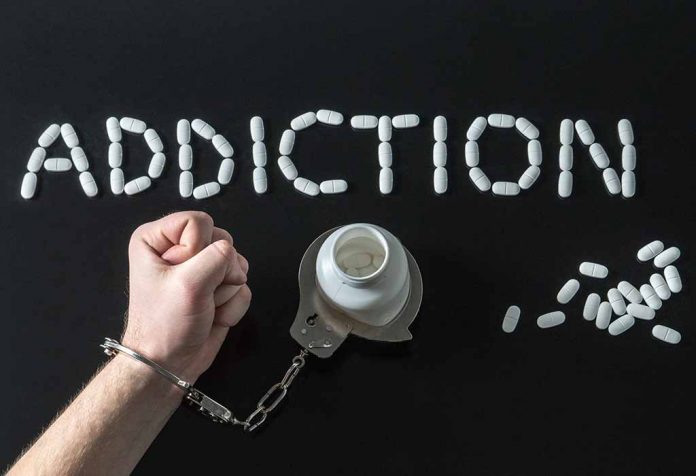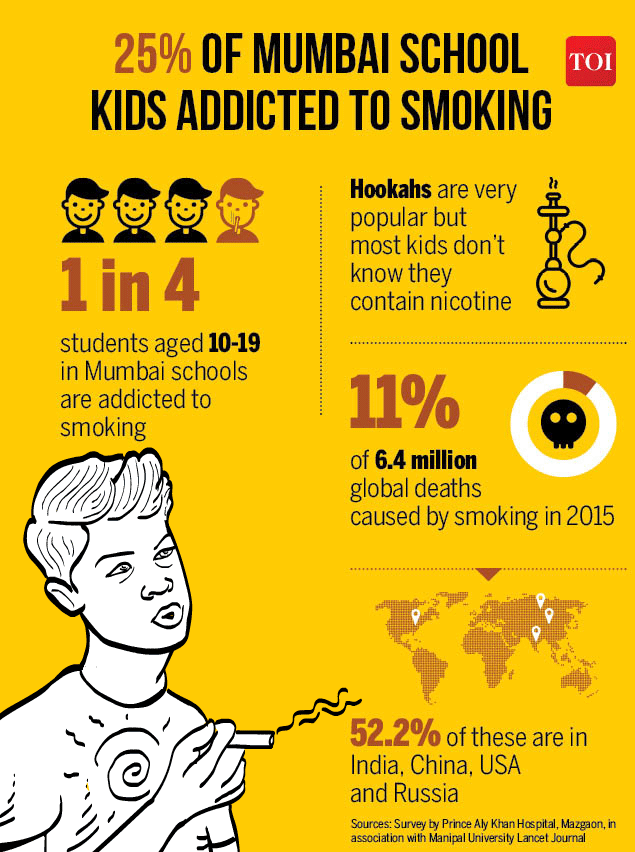In this Drug Addiction Essay, we had described drug addiction, its adverse effects; different types of drugs that are produced has different effects.
All these addictions are difficult to quit and has severe problem, health issues caused by drug addiction can persist even after a person has taken drugs.
In this article ‘Essay on Drug Addiction‘, we had provided the various essays in different word limits, which you can use as per your need:
Essay on Drug Addiction 200 words:
Drugs are a common problem this day, a large number of people worldwide suffer from this problem.
Drugs provide instant pleasure and stress relief; many people start taking drugs as an escape from their painful reality.
Few Peoples take drugs to experience how it feels or to give company to their friends before a person knows, it becomes addicted to drugs for him and it is difficult to get rid of this addiction.
Short-term enjoyment from the drugs can lead to serious long-term problems; this can cause serious health issues and behaviour changes.
Some of the symptoms of drug addiction include loss of appetite, impaired coordination and restlessness, lack of interest in work, financial issues and change of social cycle, covert behaviour, repeated mood swings and anxious behaviour.
Many argue that overcoming addiction simply requires willpower and determination; however, this is not the case, and it requires a lot.
To get rid of drug addiction, it is necessary to seek professional help and take appropriate medication.
This addiction can take years to overcome, and the possibility of relapse cannot be completely ruled out.
Drug Addiction Essay 300 words:
Intoxication weakens a person’s immune system; it causes various mental and physical illnesses; this problem can be short term or long term.
The kind of medicine a person consumes, how much he destroys it and the duration by which he takes it becomes the basis of various health problems.
Effect on Physical Health:
Drugs can affect a person’s physical health; it irritates various parts of the body, including the brain, throat, lungs, stomach, pancreas, liver, heart and nervous system.
It can cause health problems such as sickness, heart problems, damaged liver, stroke, lung disease, weight loss and even cancer.
There is a high risk of contracting AIDS by drug addicts because they usually share needles to inject drugs.
Driving under the influence of drugs or walking on the road can be risky because an accident is more likely to happen to such a person.
Effects on Mental Health:
Drugs have a severe effect on a person’s brain. Drugs delay decision making and affect a person’s psychosocial skills.
They can cause mental health issues such as depression, Alzheimer’s, insomnia, bipolar disorder, anxiety, conduct problems and psychosocial dysfunction.
Drug users have suicidal thoughts and often attempt suicide.
Effects on Unborn Babies:
Drug addiction can put unborn children at high risk. Pregnant women addicted to alcohol can harm the fetus.
Unborn babies are more likely to develop inherited disabilities and abnormal mental and physical abnormalities.
Intoxication can also lead to premature birth; some children also exhibit behavioural issues later in life.
Getting rid of drug addiction is highly recommended before planning a child.
Conclusion:
A person’s overall health becomes fragile due to regular doses of medicines; such a person often loses touch with reality and becomes confused.
Due to a nervous, immune system, he can catch infection very fast.

Essay on Drug Addiction 400 words:
People belonging to different age groups and from different walks of life are victims of intoxication.
While some can overcome this addiction with some difficulty, others are terrified into the dark world of drugs forever.
A person needs to be prepared to try as much as possible to get rid of drug addiction and to overcome this abuse.
Drug Addiction Risks:
While anyone can develop a drug addiction, some people are more likely to create it. Here’s a look at those who are at high risk of developing drug addiction:
People have had some heartbreaking/ painful experiences in life.
Those who have a family history of intoxication; also, suffers mental or physical abuse or neglect.
Those are suffering from depression and anxiety.
Ways to Overcome Drug Addiction:
Here are some ways to overcome addiction:
- Enrol in a rehabilitation centre.
- This is one of the main steps to overcome drug addiction.
- Good rehabilitation centres have qualified and experienced professionals who know how to deal with addicts and help them get rid of drug addiction.
- Meeting other drug addictions and seeing how hard they are trying to quit this addiction to regain a healthy life can also be encouraging.
- Seek help from friends and family
- Love and support from your near and dear ones can play an important role when it comes to getting rid of drug addiction.
- This can help determine dependency and may prompt you to give up this disgusting habit.
- Therefore, do not hesitate to discuss this problem with them; they will be more than willing to help you get rid of addiction.
Treatment:
As you stop the consumption of drugs, you may suffer from symptoms & medication is required to deal with these symptoms, it also helps prevent relapse.
Health issues caused by drug addiction also need to be corrected & medications will help cure them.
Conclusion:
It can be challenging to give up the addiction; however, this is not impossible to do.
Strong determination and support from friends and family can help relieve addiction.
Drug Addiction Essay 500 words:
Intoxication affects physical health severely; this puts the addict at risk of health problems such as cardiac arrest, stroke and abdominal pain.
It also causes mental health issues such as depression, insomnia and bipolar disorder, etc.
Apart from affecting a person’s health, intoxication also affects human behaviour.
All types of drugs, including cocaine, marijuana, and weed, affect the brain’s instinct and cause mood swings, resulting in behavioural problems.
Common behavioural issues faced by drug addicts:
Intoxication falters with a person’s brain function; it interferes with the way a person behaves and the kind of choices they make.
Aggression:
A person who is under the influence of drugs can be highly aggressive. Drug addicts often get angry over trivial matters.
This behaviour is not seen only when they are experiencing high; the frequent use of drugs someway communicates aggression in their personality.
It is difficult to get along with such people; you need to be extremely vigilant around them as they can throw up frequent bouts of anger and aggression.
Poor judgment:
Drug addiction bars a person’s ability to reason; they are unable to make appropriate decisions.
They can no longer distinguish between what is right and what is wrong.
Impulse:
Drug users also display impulsive behaviour; they act and react without much thought. This behaviour is usually displayed when they are feeling high.
However, they may also exhibit impulsive behaviour when they return to their normal state.
Drug addicts mostly make decisions they later regret.
Loss of self-control:
Drug addiction dominates the minds of addicts, and they lose self-control.
They have an intense craving for drugs and are difficult to resist even if they want to.
Drugs dominate their decisions, actions, reactions and behaviour.
Low performance in work:
A person who is addicted to narcotics experiences a decline in performance at work/school.
He is unable to concentrate on his work and continually thinks about taking drugs.
When he does not get his supplies, he feels sluggish and low on energy; all this is a significant obstacle to work.
A myth:
It has been noted that people under the influence of drugs often have hallucinations; they see things and hear noises that don’t exist.
Medications specifically known for hallucinations include salvia, mescaline, LSD, psilocybin mushrooms, and ketamine.
Venereal disease:
Trying to conceal your drug addiction from family and friends’ drug addicts often leads to underlying conditions.
They usually avoid spending time with their parents/children/spouse.
They often socialize with other drug addicts and stop hanging out with other friends; this often makes them socially awkward.
Conclusion:
Drug addiction can cause behavioural problems that can negatively affect a person’s personal as well as professional life.
It is an addiction that the person should get rid of as soon as possible.
A person may struggle to make positive changes in his behaviour long after he has given up his intoxication.
Essay on Drug Addiction 600 words:
Large amounts of dopamine are released from the use of drugs, which puts a person in ecstasy.
People like to experience this blissful state and desire to come here again and again, which is one of the leading causes of intoxication.
Initially, most people take drugs voluntarily, but it soon becomes an addiction & it is the worst type of addiction.
It is difficult to quit and can also have negative consequences after a person gets rid of this addiction.
Drugs Type:
They are classified into three types.
Depressants: It includes cannabis, opiates, benzodiazepines, and alcohol.
They are known to slow the speed of messages going to and from the brain and thus reduce the ability to handle a situation.
When taken in small amounts, depression can make a person feel relaxed; however, when taken in large numbers, they can cause nausea, vomiting and fainting.
Stimulants: Stimulants, on the other hand, speed up messages going to and from the brain.
They have the power to boost a person’s confidence level immediately.
On the downside, they can cause high blood pressure, increase heart rate and cause restlessness, agitation and insomnia.
Frequent use of such drugs leads to panic attacks, anxiety and paranoia, stimulants include nicotine, caffeine, cocaine, and amphetamine.
Hallucinogen: Hallucinogen contains mescaline and psilocybin. These drugs cause hallucinations and distort the reality of a person.
When taken continuously, these medicines can cause high blood pressure, nausea, paranoia and numbness.
Signs and Symptoms of Drug Addiction:
A person who is addicted to drugs is likely to show the following signs and symptoms:
- Change in appetite.
- Unexpected weight gain or weight loss.
- Change in sleep pattern.
- Slurred speech.
- Switch to the circle of friends.
- Suddenly angry.
- Bloodshot eyes.
- Lack of interest in work.
- Underperformance at work/school.
- Dishonest behaviour.
- Feeling of dullness, distant and apathetic.
- Frequent mood swings.
- Lack of motivation.
- Disgusting behaviour.
- Drug addiction impacts professional life.
Drugs have adverse effects on a person’s brain; People lose their self-control; they become so addicted to drugs that everyone thinking about them is eating them.
They are unable to concentrate on work and lose interest in it; even if they try to work, they feel tired and withdraw.
Drugs have an impact on their cognitive skills, analytical skills, and decision-making power & adversely affects their professional lives.
Drug addicts also exhibit irrational behaviour; they become aggressive, develop impaired judgment and grow impulsive.
Such behaviour is unacceptable in an office setting & puts them in a bad light and prevents the possibility of professional development.
Drug Addiction Affects Personal Relationship:
A drug addict loves the company of drug users and tries to spend most of his time with them; he is no longer interested in his family and friends.
This often leads to arguments and quarrels that spoil their family life as well as their equation with their friends.
A drug addict spoils not only his life but also peoples around him.
Also, read 1. Terrorism Essay 2. Corruption in India 3. Child labour Essay 4. Blood donation Essay
Conclusion:
In this Drug Addiction Essay, we had described the Drugs can strengthen a person’s ability to think and act; it can rise to many health hazards, behavioural problems and relationship issues.
The safest way is to stay away from drugs; people who are addicted to drugs have little chance of quitting the addiction.
It ruins their lives and causes deep sorrow to their loved ones.
• Section Under Essays
